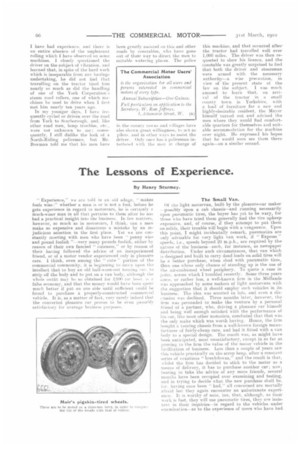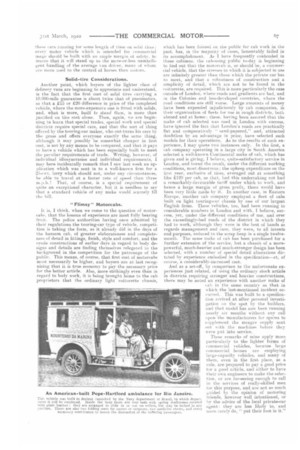The Lessons of Experience.
Page 4

Page 5

If you've noticed an error in this article please click here to report it so we can fix it.
By Henry Sturmey.
" Experience," we are told in an old adage, " makes fools wise :'' whether a man is or is not a fool, before he gets experience in regard to motorcars, he is certainly a. much-wiser man in all that pertains to them after he nas had a practical insight into the business. In few matters, however, so much as in motorcars, I think, can a man make so expensive and disastrous a mistake by an injudicious selection in the first place. Yet we are constantly meeting with men who have been " penny wise and pound foolish "—very many pounds foolish, either by reason of their own fancied " cuteness," or by reason of their having followed the advice of an inexperienced friend, or of a motor vendor experienced only in pleasure cars. I think, even among the " cute " portion of the commercial community, it is beginning to Of the light motorvan, built by the pleasure-car maker-possibly upon a cab chassis—and running necessarily upon pneumatic tires, the buyer has yet to be wary, for those who have tried them generally find the tire upkeep expensive, and, of course, if they attempt to put them on solid-s, their trouble will begin with a vengeance. Upon this point. I might incidentally remark, pneumatics are only advisable for very light van work, if " Express " speeds, i.e., speeds beyond 20 m.p.h., are required by tlie. nature of the business—such, for instance, as newspaper distribution. Under such circumstances, that van which is designed and built to carry dead loads on solid tires will be a better purchase, when shod with pneumatic tires, than one whose only chance of standing up is the use of the air-cushioned wheel periphery. To quote a case in point, across which I tumbled recently. Some three years since, or rather less, a well-known firm in the Midlands was approached by some makers of light motorvans with the suggestion that it should employ such vehicles in its business. The idea was scouted in tote, and even a discussion was declined. Three mouths later, however, the. firm was persuaded to make the venture by a personal friend of a partner, who, driving a pleasure car himself and being well enough satisfied with the performance of his car, like most other motorists, concluded that that was the only make which was worth having. Hence, the firm bought a touring chassis from a well-known foreign manufacturer of fairly-cheap cars, and had it fitted with a van. body to a special design. .The result was, as might have been anticipated, most unsatisfactory, except in so far as proving to the firm the value of the motor vehicle in the facilitation of business. Less than a couple of years saw this vehicle practically on the scrap heap, after a constant series of vexatious " breakdowns," and the result is that, whilst the firm has decided to stick to the motor as a means of delivery, it has to purchase another car; now, fearing to take the advice of any more friends, several months have been occupied over examining and testing, and in trying to decide what the new purchase shall be, 2,,r, having once been " had," all concerned are mortally afraid lest they again encounter an unfortunate experience. It is worthy of note, too, that, although, as their work is fast, they will use pneumatic tires, they are insistent in their inquiries—in regard to the vehicles under examination—as to the experience of users who have had. zhe,e cars running for some length of rime n solid tires : every motor vehicle which is intended for vonimercial thsage should be built with an ample mnrgin ol :safety. to insure that it will stand up to the more-or-less unintellieent handling of the average van driver, many 1./t W110111 are more used to the control of horses than motors. Solid.-tire Considerations. Another point, which buyers of the lighter class of delivery vans are beginning to appreciate and understand, is the fact that the first cost of solid tires carrying a 10.000-mile guarantee is about twice that of pneumatics, so that a £15 or difference in price of the completed vehicle, where the more-expensive one is fitted with solids, and, what is more, built to stand them, is more than justified on tire cost alone. Then, again, we are beginning to learn that special trades, special work and special districts require special cars, and that the sort of thing offered by the touring-car maker, who out-turns his cars by the gross and offers everyone exactly the same thing, although it may possibly be somewhat cheaper in first cost, is not by any means to he. compared, and that it pays to have a vehicle which has been especially built to meet the peculiar requirements of trade. Writing, however, of individual idiosyncrasies and individual requirements, I may here incidentally remark that I saw last week an application which was sent in to a well-known firm for a 2.'evert. lorry which should not, under any circumstances„ he able to travel at a faster rate of speed than rhuee M.p.h.! That, of course, is a special requirement of quite an exceptional character, hut it is needless to say that .a standard vehicle of any make would scarcely fill the bill. "Flimsy" Motorcabs. IL is, I think, when we come to the question of motorcabs, that the lessons of experience are most fully bearing fruit. The police authorities having once admitted by their regulations the touring-car type of vehicle, competition is taking the form, as it already did in the days of the hansom cab, of greater elaborateness and completeness of detail in fittings, finish, style and comfort, and the crude constructions of earlier days in regard to body designs and details are finding themselves relegated to the background in the competition for the patronage of the public. This means, of course, that first cost of motorcabs must necessarily be higher, and buyers are at last recognizing that it is true economy to pay the necessary price for the better article. Also, more strikingly even than in regard to body work, it is being broughthome to the cab proprietors that the ordinary light voiturette chassis, which has been foisted on the public for cab work in the past, has, in the majority of cases, lamentably failed in its accomplishment.. hs I have frequently contended in these columns, the ea ti-using public to-day is beginning to find out that the motoreab is, or should be, a conarrier cial vehicle, that the stresses to which it is subjected in use are infinitely greater than those which the private car has to meet, and that a robustness of construction and a simplicity of detail, which are not to be found in the vuiturette, are required. This is more particularly the case outside of London, where roads and gradients are bad, and in the Colonies and less-developed countries, where the road conditions are still worse. Large amounts of money have been expended injudiciously by cab companies, in their organization of fleets for use in rough districts, both abroad and at home; these, having been assured that the make of cab selected was used in London with success, have ignored the fact that London's roads are practically flat and comparatively " sand-papered," and, attracted doubtless by an advantriF,re in price, have selected such models for their operations. As to the results of such experience, I may quote two instances only. In the first, a cab company operating in a large city in South America selected a well-known Continental make of cab, which has given and is giving, I believe, quite-satisfactory service iii Loedon, and found the result, under the different working conditions, most disastrous; the upkeep expenditure on the first year, exclusive of tires, averaged out at something like £120 per cab, so that., had this undertaking not had it remarkably-favourable tariff under which to work, and hence a large margin of gross profit, there would have been very little made by it. In another case, in Eastern Europe, another cab company employed a fleet of cabs built on light touring-car chassis by one of our largest English firms. These vehicles, too, had been running in considerable numbers in London and with, I believe, success, yet., under the different conditions of use, and over the exceedingly-bad roads of the district in which they had to work, although they were in the best of hands as regards management and care, they were, to all intents and purposes, reduced to the scrap heap in a single twelvemonth. The SR)Ile make of cab has been purchased for a further extension of the service, but a chassis of a morepowerful, much-heavier and much-stronger design has been selected, with a number of special detail alterations dictated by experience embodied in the specification—at, of course, a considerably-inereased cost. And as a set-off, by comparison to the unfortunate experiences just related, of using the ordinary stock article in districts requiring stronger and heavier constructions, there may be noted an experience with another make of cab in the seine country as that hich the last-mentioned incident oc cupied. This was built to a specificathm arrived at after personal investigation on the spot by the builders, and that model has mow been running nearly six months without any call upon the manufacturers for spares to supplement the meagre supply sent lilt with the inaellines before they were put into service. Those remarks of mine apply more particularly to the lighter forms of commercial vehicles, because large commercial houses are employing large-capacity vehicles, and many of them, even in the first place, as a rule, are prepared to pay a good price for a good article, and either to have their own engineers to make the selection. or are far-seeing enough to call in the services of really-skilled men for this purpose, and are not so much euideci by the opinion of motoring friends, however well intentioned, or i,v the advice of the local private-car agent: they are less likely to. and more rarely do, " put their foot in it."


















